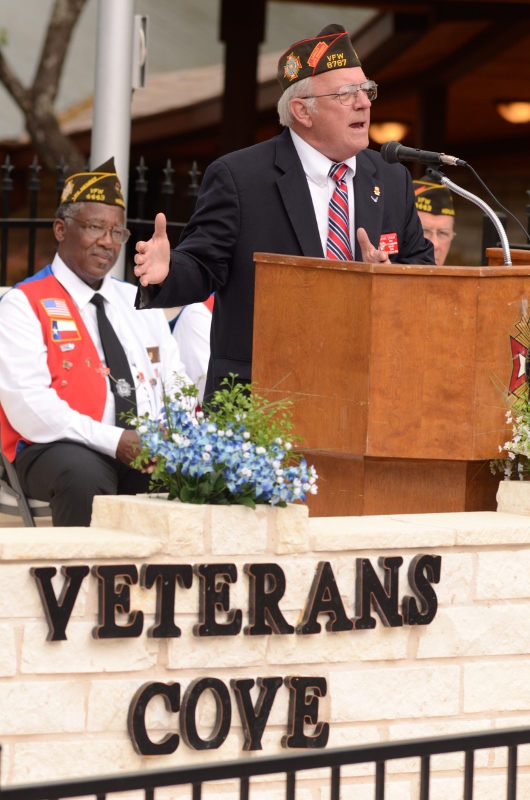
Frank Buckles, the last surviving U.S. veteran of World War I -- of nearly 5 million Americans who served during that war -- died last month at age 110.
Buckles, who served in England and France, was a member of a steadily aging and shrinking group of heroes from our "early" major wars -- where I am also including World War II, the Korean War and the Vietnam War -- the Veterans of Foreign Wars (VFW).
One of these veterans is John Tschirhart, a decorated World War II combat veteran who, at age 91, is the oldest member of VFW Post 4443, a beautiful, brand new post in the scenic hill country surrounding Austin, Texas.
John was among a group of World War II veterans who stood proudly when asked to rise by the past national commander of the VFW, John E. Nier, during the grand opening of Post 4443. The average age of World War II veterans is 87. We are losing these veterans at the rate of approximately 1,000 per day!
Most of the other members of the Post are Korea and Vietnam War veterans whose ages range from the late 50s to the early 80s. This is quite typical among VFW posts.
While the national VFW organization, its 7700 posts and more than 1.6 million members are doing a yeoman's job of supporting and assisting the younger generation of active duty military members and the veterans of our most recent wars -- Iraq and Afghanistan -- VFW posts are oftentimes viewed as smoke-filled "watering holes" where a bunch of old guys sit around drinking beer, playing bingo and telling war stories.
As Nier put it during the ceremonies at Post 4443, "our returning Iraq and Afghanistan veterans, so many of whom have had multiple combat tours of duty, so many of whom have missed two or three years in the lives of their 3- or 4-year-old child...they are not looking for a place to have a free beer..."
These veterans who are finally returning home from arduous combat duty in far-away places after long absences from their loved ones have different needs than the older, established veterans.
In his keynote address, the Post Commander, Henry "Hank" Irwin, recognized both the different needs of our younger returning veterans and the obligation the older VFW members have to meet the needs of "our children all grown up and joining the ranks of honored fighting men to preserve the freedoms and liberties of a nation they too have come to love."
Combat veterans who, "As a result of their combat training and in the heat of battle...learn to disassociate from self and family, focusing only on the enemy that is trying to do harm to them or their comrades."
Irwin continued:
Over an extended period of time, this disassociation becomes their reality and upon their return home, they find difficulty reuniting with themselves, their family and the communities in which they live. There is no training available to undo what they have learned and only time and loving care will change their disassociated reality. Our military leaders have realized the need and the government is trying to develop appropriate programs to give our returning veterans the assistance they need. But is this enough?
Irwin and the members of VFW Post 4443 do not believe it is enough and have done something about it.
They have taken innovative and concrete steps to attract the younger Iraq-Afghanistan war veterans by offering facilities, amenities, services and family activities that are more appealing to these newest combat veterans and their young families.
They are offering their Post "as a safe haven for returning veterans...a place where they can enjoy the quiet peace and tranquility needed for them to find themselves...a place where they can bring their families and enjoy the swimming pool, quiet game rooms, picnic and BBQ areas."
In his closing remarks, Irwin said:
As [these veterans] become comfortable and join our ranks as members, they will share our relationship with the community and welcome the opportunity to become more active in community affairs. We are living in changing times, where our older veterans are retiring from life and activities in the community. We must pave the way for these new warriors, allowing them the leadership opportunities that will insure the longevity of our comradeship and the community. This is what we offer to our returning veterans.
Irwin and the members of VFW Post 4443 hope that VFW posts throughout the nation will follow their lead and similarly adapt to better serve our newest combat veterans.
Both U.S. Senator John Cornyn (R-Texas) and U.S. Representative Lloyd Doggett (D-Texas) have congratulated Post 4443 for providing such a special place for the veterans in the Austin community.
Cornyn took special note of the Post's trailblazing efforts towards meeting the needs of our newest and future veterans. "I commend your membership for its vision of 'Veterans Cove' and for making sure next generations of veterans have a family friendly post to enjoy," the Senator wrote in a letter to the Post.
Please read more about this truly foresighted VFW Post at their web site.
Photograph by Caleb Bryant Miller, calebbryantmiller.com
This story is part of Military Families Week, an effort by HuffPost and AOL to put a spotlight on issues affecting America's families who serve. Find more at jobs.aol.com/militaryfamilies and aol.com.
